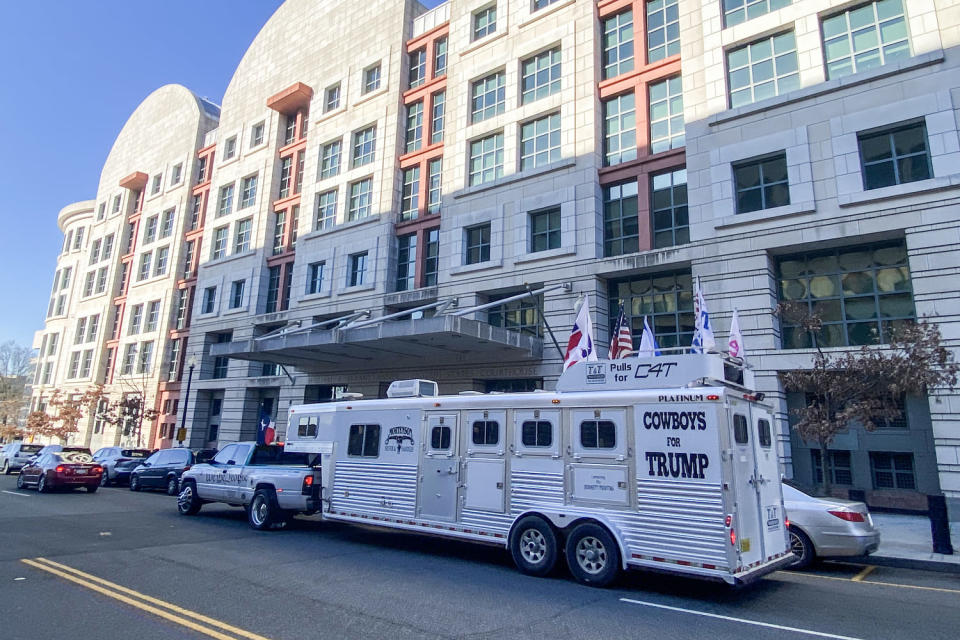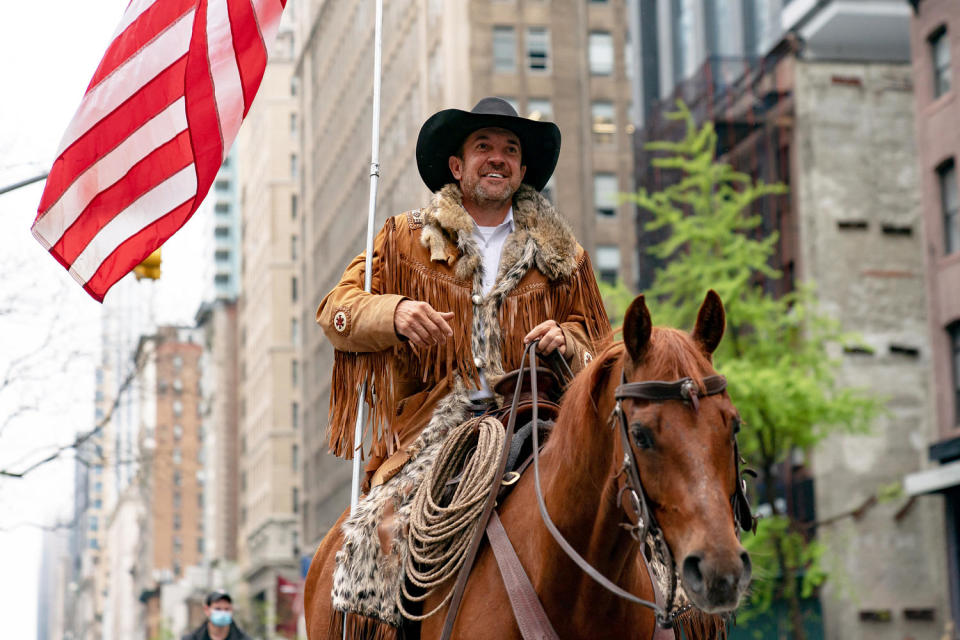'Cowboys for Trump' founder is hoping a Supreme Court ruling on ballot eligibility could help him, too
- Oops!Something went wrong.Please try again later.
- Oops!Something went wrong.Please try again later.
WASHINGTON — Couy Griffin is a fervent supporter of Donald Trump, but he has an additional reason for hoping the Supreme Court rules that the former president can stay on the ballot in Colorado — the decision could benefit him as well.
Griffin, a founder of "Cowboys for Trump," was criminally convicted for his participation in the events of Jan. 6 that led to an attack on the U.S. Capitol and was later kicked out of office as a county commissioner in New Mexico as a result.
He has his own appeal pending at the Supreme Court that raises questions similar to Trump's appeal argued last week.
Griffin was removed from his elected position based on the same theory that Colorado officials cite to prevent Trump from appearing on the ballot: a section of the 14th amendment that says those who “engaged in insurrection” cannot hold office.
Based on oral arguments last week, it appears likely the Supreme Court will rule for Trump in his case. The Supreme Court's reasoning could then apply in Griffin's case.
Griffin said in an interview he listened to some of the argument and was heartened by the justices' questions.
"President Trump is at the very top and I am at the very bottom, but a lot of the things they are trying to go after Trump on they have already been after me on,” he said. “I have kind of been a testing ground for the legal stuff.”
The justices are scheduled to discuss Griffin's case in private for the first time at their regular private conference on Friday.

A state judge removed Griffin from his position as a commissioner in Otero County, New Mexico, in September 2022 after concluding that his actions on Jan. 6 made him ineligible to serve.
Earlier that year, Griffin was convicted of illegally entering the Capitol grounds, although he was acquitted of engaging in disorderly conduct during chaotic scenes in which Trump supporters attempted to prevent Congress from certifying President Joe Biden's election win.
Section 3 of the 14th Amendment, enacted in the wake of the Civil War, prevents anyone who previously took an oath to defend the Constitution from holding various government offices. It was passed to prevent former Confederates from returning to government but has rarely been enforced.
In Trump's case, questions asked by the justices indicated the court could rule that only Congress could enforce Section 3 against a presidential candidate.
Donald Sherman, a lawyer at Citizens for Responsibility and Ethics in Washington, a left-leaning watchdog group that represents plaintiffs in both the Trump and Griffin cases, said Griffin would lose out even if the Supreme Court rules in Trump's favor.
That is in part because of technical legal issues about how Griffin's case was litigated, but also because the Trump ruling could just focus on federal offices and not state ones, he said.

In the Trump oral argument, justices "raised questions about states enforcing Section 3 against those seeking national office, but expressed no concern about state enforcement against state officials," Sherman wrote in an email.
Griffin's lawyer, Peter Ticktin, said the New Mexico court ruling made no distinction between federal and state offices, meaning Griffin can't hold any government position.
"He can't even run for dog-catcher," he said.
Vikram Amar, a professor at the University of California, Davis School of Law who filed a brief in the Trump case saying that Section 3 does not have to be enforced by Congress, said the ruling could distinguish between the presidency and other offices but that such a distinction would be "fabricated by the court."
If the court rejects the argument that Section 3 is self-executing, "I suppose you can make up whatever you want," he added, which could mean Griffin loses out.
Griffin, who at one point planned to ride a horse to his trial in Washington before abandoning the idea, said the entire process to remove him from office was unfair.
"It’s amazing. We live in a country where the headline is 'democracy is under attack,' and they use a civil bench trial to remove an elected official," he said.
Griffin, however, is not eyeing a return to elected office even if he were to win his case. He is hoping Trump wins the presidential election and appoints him to a position in the federal government.
The one potential problem with that plan: Section 3 applies to appointed positions, too.
This article was originally published on NBCNews.com

